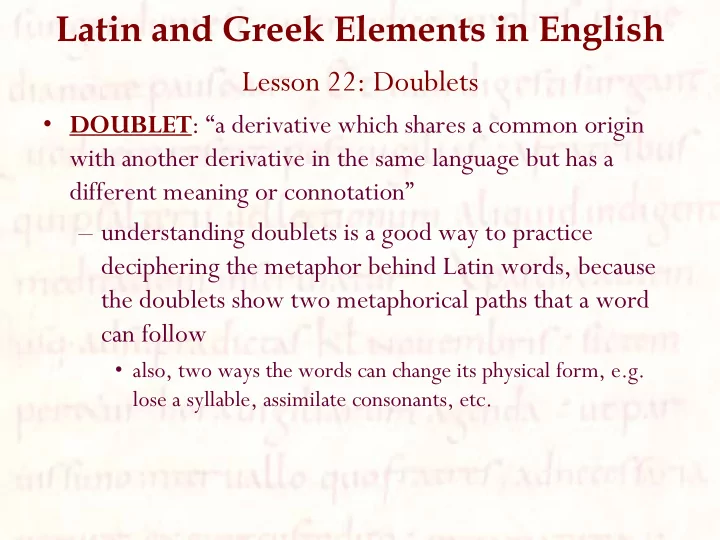

Latin and Greek Elements in English Lesson 22: Doublets • DOUBLET : “a derivative which shares a common origin with another derivative in the same language but has a different meaning or connotation” – understanding doublets is a good way to practice deciphering the metaphor behind Latin words, because the doublets show two metaphorical paths that a word can follow • also, two ways the words can change its physical form, e.g. lose a syllable, assimilate consonants, etc.
Latin and Greek Elements in English Lesson 22: Doublets • Latin gens , “noble family, aristocrat clan” – genteel: “well-born” – gentle: “well-mannered, kind,” e.g. gentleman • later, “domesticated, mild, soft” – jaunty: “well-bred, elegant, fashionable, stylish”
Latin and Greek Elements in English Lesson 22: Doublets • Latin hostis , “stranger, enemy” – hostile (from “enemy” sense): “p.t. an enemy” – host (from “stranger” sense”): “one who entertains strangers in his abode, an innkeeper” • also, host in the sense of “a body of strangers/visitors,” e.g. the heavenly host – guest: “a visiting stranger” • from Common Germanic root *gastiz, cognate with hostis • both from IE base *ghostis (“stranger”), cf. Gk. xenos
Latin and Greek Elements in English Lesson 22: Doublets • Latin vitulari , “to celebrate a victory, to be joyful” – viola: “alto/tenor violin,” i.e. musical instrument played in celebrations of joy and victory • n.b. loss of t through French • cf. loss of g in other French forms: – Lat. fragile > Fr. frail – Lat. flagellate > Fr. flail – Lat. gigantic > Fr. giant – fiddle: “stringed musical instrument” • v > f: typical of Germanic languages
Latin and Greek Elements in English Lesson 22: Doublets • Latin pandurium , “curved musical instrument” – from Greek pandoura (“three-stringed lyre”) • corruption of the name Pandora? – mandolin: “lute-like instrument” • Ital. pandora > Eng. bandore (16 th c.) > Ital. mandora (18 th c.) > Ital. mandolin (with diminutive suffix) – banjo: “guitar-like instrument with resonating back made of parchment” • < African-American pronunciation of bandore
Latin and Greek Elements in English Lesson 22: Doublets • Latin pipare : “to cheep, to peep” – pipe: Romance/Germanic pipa • cf. pigeon < pipio (“peeper”) – fife: German pfeife • cf. the name Pfeiffer (“fifer”) • Greek spongos (later, sphongos ): “sponge” – sponge: n.b. Greeks are good divers – fungus: originally, “mushroom” • later, “spongy excrescence, fungus”
Latin and Greek Elements in English Lesson 22: Doublets • Ecclesiastical Latin unio : “the number one” – union: “act of being united, unity” • cf. the Union Jack – the flag of the united crowns of England and Scotland – jack: “a ship’s flag, usually small” – onion: originally, “a large pearl” • later, “the bulb of a plant, onion”
Latin and Greek Elements in English Lesson 22: Doublets • Latin taberna : “booth, hut, tent” – tavern: “a shack in which drinks are sold” (13 th c.) – tabernacle: “the tent containing the Ark of the Covenant, any such canopied, moveable structure” • later, “a place of worship but not a church,” often with a pointed roof like a tent (17 th c.) • n.b. diminutive suffix -cle
Latin and Greek Elements in English Lesson 22: Doublets • Latin supranus : “higher” – sovereign: “ruler” • n.b. folk etymology: -(r)ane suffix > -reign (as in a king’s reign) – soprano: “highest singing voice” • Latin nescius : “ignorant” (ne- + SCI-, “not know”) – nice: as we saw in Lesson 10 – unscientific: “not knowing” • Greek acme : “(top) point” – acne: “skin infection,” resulting in pointed boils
Latin and Greek Elements in English In Lesson 25 (next class), do not try to analyze the suffixes of the word in Exercise I, p. 137-8. These suffixes come directly from Latin and will not necessarily be familiar to you.
Recommend
More recommend